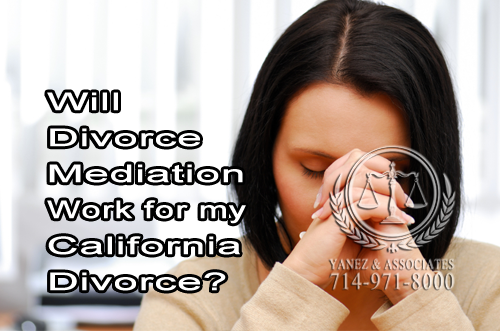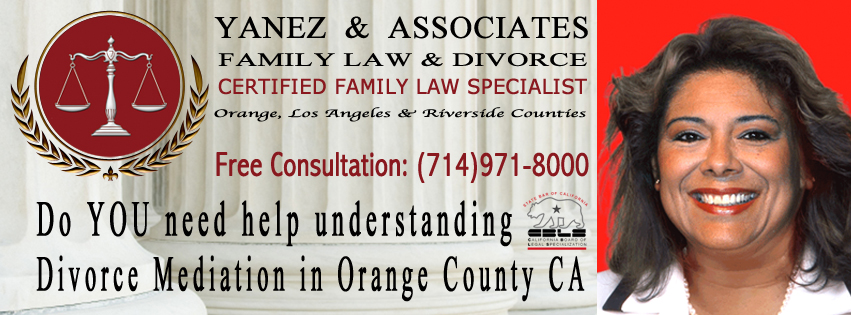What is Divorce Mediation?
Do you need help understanding Divorce Mediation in Orange County CA: When a couple decides to divorce, the terms of the divorce need to be determined. Terms of every divorce are unique, and some couples may have more to discuss than others. Usually, divorces can include the following terms.
• The division of community assets and debts;
• Child custody and visitation;
• Child support; and
• Spousal support.
Depending on your divorce, the number of debts and assets you and your spouse own, or whether or not you have children together, your divorce can be more or less complex. Mediation is a form of alternative dispute resolution that allows the divorcing couple to work with each other to determine the terms of their own divorce.
Will Divorce Mediation Work for my California Divorce?

It is always best to consult with an experienced family law attorney to help you assess your possible divorce mediation situation
It is always best to consult with a family law attorney before making decisions about your divorce. Mediation is usually the best option to resolve many types of cases, not only divorce. However, if you and your spouse or partner have good communication skills, both want to work on your communication skills, or have similar goals for your divorce, mediation may be a good option.
However, if domestic violence has been an issue in your relationship, your attorney may advise against mediation. Similarly, mediation requires the cooperation of both parties, so even if you attempt mediation, you may end up in court in the end if you cannot come to an agreement.
Sometimes mediation works better for some issues and not for others. For example, if you and your spouse can agree on how to divide assets and debts, but cannot agree on child support, you may choose to determine your division of assets and debts through mediation, but use litigation or another method for child custody.
What Happens in Divorce Mediation in California?

Can some one explain to me, What Happens in Divorce Mediation in California?
Mediation requires both parties and one mediator to be present. Anything that is said in mediation is confidential, and neither party is allowed to be represented by an attorney in mediation, or to have a lawyer present. The mediator may be an attorney, but must remain neutral and cannot provide legal advice to either party. Mediators are often mental health professionals, attorneys or judges, but they must have received
Mediators have received special training, and their job is to facilitate a healthy discussion between the divorcing parties so that they can find an agreement that could become the terms of their divorce agreement. At the end of mediation, the mediator can draw up a mediation agreement to be submitted to the judge for approval as the divorce agreement.
Meeting with a Divorce Mediator
Every mediator will handle his or her mediation slightly different. However, the following is a general overview of the process.
Once you and your spouse or partner have agreed on a mediator, you’ll have your first meeting. Mediation can be at any time or location that the two parties and the mediator can agree to. At the initial meeting, both parties should be encouraged to share their goals for mediation. The mediator will usually write up a mediation agreement that states these goals, as well as any specific concerns either party may have.
Both parties will likely be asked to sign the mediation agreement, which basically lays out a plan for mediation. The mediator may ask that either or both parties bring certain documentation to the next meeting, or ask them to consider certain aspects of the divorce and figure out what they want to ask for prior to meeting again.
Contacting an Attorney
At any point during mediation, as long as it is done outside of the actual mediation meetings, either party may consult with a divorce attorney to discuss concerns, ask for advice, or request that an attorney look over any documentation from mediation.
Following Appointments with a Divorce Mediator
The following appointments can take as much or as little time as the divorcing couple would like. Depending on how quickly or easily the parties can come to an agreement, they can have many subsequent meetings with the mediator, or few. The time between the meetings can also vary, and meetings may be scheduled according to the couple’s wishes or how quickly each party collects the necessary documentation or makes up his or her mind about what to ask for in mediation.
At the following meetings, both spouses and the mediator will meet and discuss the items listed in the mediation agreement. The mediator may also ask to meet with the spouses or partners individually to get an idea of what that spouse wants.
Finishing Divorce Mediation
Following each meeting, the mediator will usually draw up a concluding document which states what was agreed upon during the meeting. If all issues can be resolved, the mediator will draft a settlement agreement that lists these agreements.
Each party will then have the opportunity to present this settlement agreement to a separate divorce attorney outside of mediation prior to signing it. Once the document has been signed by both parties, the mediator can submit the document to the court for approval, and the mediation agreement may become the terms of the divorce settlement.
If there are any remaining issues that were not resolved through mediation, they may be taken to court to be determined by a judge.
How do I Find a Quality Orange County Divorce Mediator?

To Find a Quality Orange County Divorce Mediator call us at 714-971-8000
When you’re looking for a divorce mediator, you may want to ask your divorce attorney for suggestions.
Make sure to ask your potential mediator a few questions prior to hiring him or her.
• What training was required prior to becoming a divorce mediator?
• How long have you been working as a divorce mediator?
• What do you estimate that my divorce mediation will cost? How long will it take?
• What is the process of divorce mediation like if I choose to hire you?
Contact an Attorney for Your Divorce Mediation in Orange County CA
In Summary, divorce mediation is becoming a more common option for families. Mediation is a newer form of conflict resolution between parties. This option is more affordable than the regular divorce proceedings. In a divorce mediation proceeding the parties will need to willingly agree to attend. The benefit of mediation is that it is an optional meeting between the parties in an attempt to reach an amicable agreement.
The pricing for divorce mediation will vary so it is important to inquire with various divorce mediation attorneys. Some divorce attorneys offer discounts to military, as well as flexible payment plans. If you are interested in a payment plan it is important to ask what your options are.
The mediation process involves a neutral third party. Both parties will need to follow the ground rules set forth by their mediator. It is important that all parties respect one another and refrain from name calling and interruptions. Each party will be allotted an equal amount of time to discuss their concerns.
If you are ready to take the next steps toward retaining a family attorney please call today to schedule your initial consultation. For additional information regarding divorce mediation please call your local family law attorneys. Please call Yanez & Associates for your free initial consultation at 714-971-8000. We look forward to assisting you with your divorce mediation matter.

If you’re considering divorce mediation to resolve your divorce in California, contact Yanez & Associates. Our attorneys are experienced in both divorce litigation and alternative dispute resolution, including divorce mediation in California. Contact us today to schedule your free initial consultation, and we’ll help you determine whether mediation is the right option for you.













